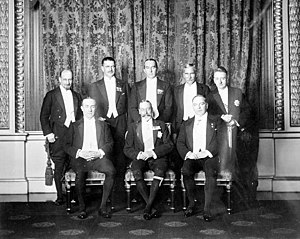| 1926 Imperial Conference | |
|---|---|

The King (front, centre) with his prime ministers. Standing (left to right):
W.S. Monroe (
Newfoundland),
Gordon Coates (
New Zealand),
Stanley Bruce (
Australia),
J. B. M. Hertzog (
Union of South Africa),
W. T. Cosgrave (
Irish Free State). Seated:
Stanley Baldwin (
United Kingdom), King George V,
William Mackenzie King (
Canada). | |
| Host country |
|
| Date | 19 October 1926– 23 November 1926 |
| Cities | London |
| Heads of State or Government | 8 |
| Chair | Stanley Baldwin ( Prime Minister) |
| Follows | 1923 |
| Precedes | 1930 |
| Key points | |
Balfour Declaration, constitutional arrangements | |
The 1926 Imperial Conference was the fifth Imperial Conference bringing together the prime ministers of the Dominions of the British Empire. It was held in London from 19 October to 23 November 1926. [1] The conference was notable for producing the Balfour Declaration, which established the principle that the dominions are all equal in status, and "autonomous communities within the British Empire" not subordinate to the United Kingdom. [1] The term " Commonwealth" was officially adopted to describe the community. [2]
The conference was arranged to follow directly after the 1926 Assembly of the League of Nations (in Geneva, Switzerland), to reduce the amount of travelling required for the dominions' representatives.
The conference created the Inter-Imperial Relations Committee, chaired by Arthur Balfour, to look into future constitutional arrangements for the Commonwealth. In the end, the committee rejected the idea of a codified constitution, as espoused by South Africa's former Prime Minister Jan Smuts, but also fell short of endorsing the "end of empire" espoused by Smuts's arch-rival, Barry Hertzog. [1] The recommendations were adopted unanimously by the conference on 15 November, followed by an equally warm reception in the newspapers. [1]
Participants
The conference was hosted by King-Emperor George V, with his Prime Ministers and members of their respective cabinets:
References
Citations
- ^ a b c d Marshall, Sir Peter (September 2001). "The Balfour Formula and the Evolution of the Commonwealth". The Round Table. 90 (361): 541–53. doi: 10.1080/00358530120082823. S2CID 143421201.
- ^ Historical Dictionary of European Imperialism. Westport, Connecticut: Greenwood Publishing Group. 1991. pp. 297–298. ISBN 0313262578.
Sources
- "Imperial Conference, 1926. Summary of Proceedings". Journals of the [New Zealand] House of Representatives. Session I, Appendix, A-06. Wellington. 1927.
- Imperial Conference, 1926. Summary of Proceedings (PDF). Dublin: Stationery Office. December 1926.
- Imperial Conference
- History of the Commonwealth of Nations
- 1926 in London
- 1926 in international relations
- William Lyon Mackenzie King
- Events in London
- 1926 in the British Empire
- 1926 conferences
- October 1926 events
- November 1926 events
- 1920s in the City of Westminster
- George V
- Stanley Baldwin
- Winston Churchill
- Arthur Balfour
- United Kingdom politics stubs